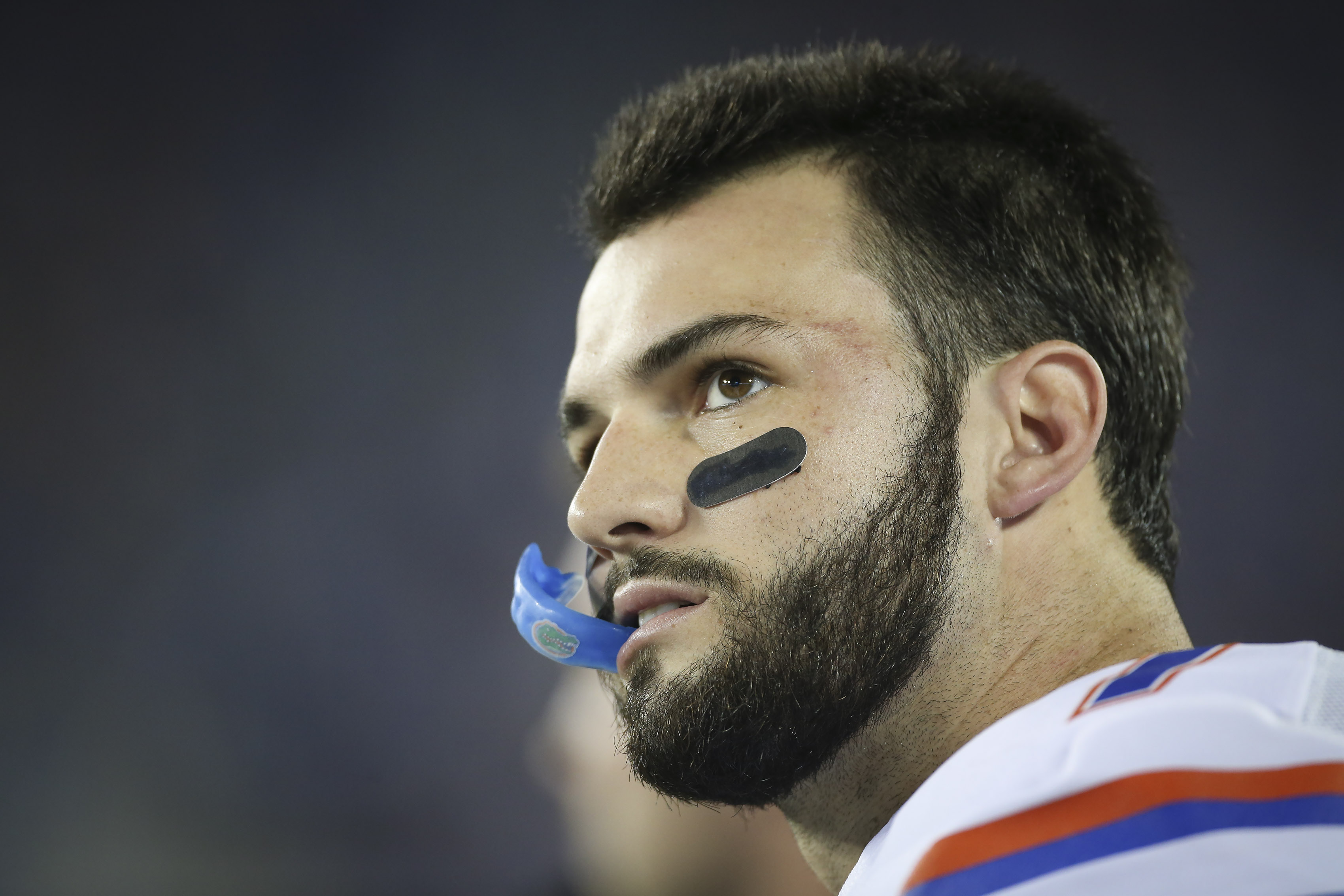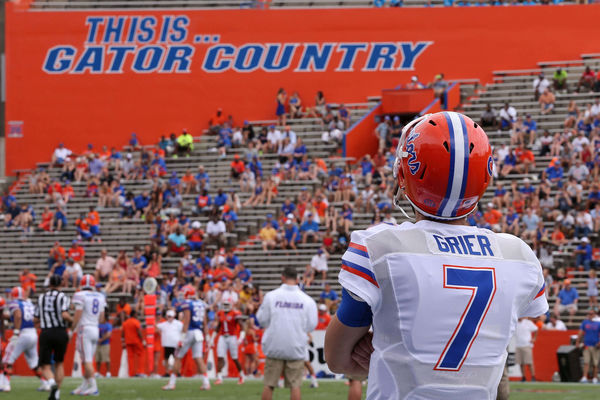Rob Foldy / Getty Images
A top-five program devoid of quarterback talent. A can't-miss pro-style QB recruit everyone wanted. It seemed like the perfect marriage. And for six weeks during the 2015 season, it was. Redshirt freshman Will Grier's college career was off to a 6-0 start, and Florida was ranked in the Top 10. Then one dumb—and avoidable—mistake ended it all.
A year later, Grier has all but disappeared from the national college football consciousness. He took an NCAA-banned performance-enhancing drug, got caught, was suspended for a calendar year in October 2015, quietly transferred to West Virginia and hasn't spoken a word about any of it publicly. Until now.
As he comes off the suspension, Grier spoke to Bleacher Report about coming to grips with it all. How it happened. How his future at Florida disappeared. And how he found a safe, comfortable spot at West Virginia, where head coach Dana Holgorsen says he has been a leader in practice and a "great presence in the locker room"—and where he could be back in games as soon as the first game of the 2017 season (or the seventh game if an appeal to the NCAA to waive his transfer year is unsuccessful).
This is his story, in his words, edited for length and clarity.
Sometimes I catch myself staying up at night, thinking about everything that has happened over the last year.
I'm not usually that kind of guy. Someone who lives in the past. I've always been focused on the future. I'm a planner, an organizer. I write things down because you can visually check them off and see progress. Writing things down is a lost art. I've got sticky notes all over my apartment.
But I do think about the last year probably more than I should—even though I couldn't be more excited about my future here at West Virginia with my teammates and with Dana. I can't wait for the 2017 season to begin.
Because this last year has felt like forever.
I thought I was doing very well at Florida. Then I get suspended. Then my head coach tells me to transfer.
I was in a dark place and depressed. ... There are times when I lay awake at night and wonder how it went so wrong.
I was in a dark place and depressed. I didn't think I was any good. I didn't know if I would ever play the game again. I lost a lot of confidence. I thought I wasn't worth a s--t.
There are times when I lay awake at night and wonder how it went so wrong. I've lost sleep over it. Many, many nights of sleep.

David Stephenson / AP Photo
There have been so many stories out there about me, so many untruths. I've always believed you can only control what you can control. I can control my attitude, my effort, my commitment to West Virginia. I can't control lies.
When I first arrived at Florida, I weighed 188 pounds at my first physical, and I weighed 210 when I started my redshirt freshman season. That's a weight gain of 22 pounds from January 2014 to September 2015. The story that I gained 40-something pounds just isn't true. It's laughable.
When I first met with the training staff at Florida and with Coach (Will) Muschamp, the idea was to put on smart weight and keep my athletic ability. I just wasn't physically ready for the pounding quarterbacks take at this level. So we decided I would redshirt and try to bulk up for 2015.
I wasn't eating anything special. My roommate (kicker Austin Hardin) and I were obsessive about eating healthy—you know, grilled chicken, vegetables and things like that. Lots of Gatorade protein drinks. I wasn't throwing down McDonald's.
Then Coach Muschamp gets fired and the new staff comes in, and we're basically on the same regimen. But because Austin and I were obsessed with eating healthy, we noticed that those Gatorade drinks are loaded with sugar and carbs. There's nothing wrong with them, but we didn't want that in our bodies.
So we went to a store in Gainesville called Total Nutrition and got some protein powder. We used that for a few months, and it seemed to work. I was putting on smart weight and was feeling healthier and more fit than I ever had. The third time we went in to buy the powder, in June 2015, the associate behind the counter, who knew us because we had been in there before, said, "You guys should try this." It was called Ligandrol.
He said it was a new thing that helped your muscles take in more protein and helped them recover faster. So we went home, and the first thing we did was look on the internet. We're not stupid; we wanted to look it up and make sure it was all clear. I looked at every NCAA site, and many other sites, to see if it was healthy for you. I wasn't going to put anything in my body that wasn't legal and wasn't healthy.
I checked each ingredient on the bottle to see if it was on the NCAA banned list. I did my research and was confident in it. What I didn't do is ask the trainers at Florida if it was cleared. I still don't know why I didn't. It's no one's fault but mine.
Ligandrol was not on the list of banned substances. But we came to find out—after our appeal to the NCAA—that it was added in August of that year. So I feel like I was given a year suspension for not telling the trainers what I was taking, and if I did tell them, they would've told me then that it wasn't on the list.
Editor's note: Ligandrol was not specifically named on any NCAA banned list until 2016-2017, but each year the NCAA's list of banned drugs clearly states, "Note to Student-Athletes: There is no complete list of banned substances. Do not rely on this list to rule out any supplement ingredient. Check with your athletics department staff prior to using a supplement." NCAA spokesman Chris Radford told Bleacher Report, "Ligandrol has never been allowed. Any substance that is chemically related to the anabolic agents class, even if it is not specifically listed as an example, is banned."
I was going through the season with no idea what could happen. Then in October, after I started and won five games, I was on the drug-test list. I had never been on the list before. They said I was randomly chosen.






